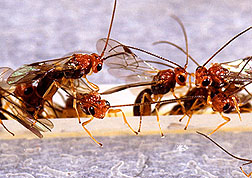This page has been archived and is being provided for reference purposes only. The page is no longer being updated, and therefore, links on the page may be invalid.
Device Speeds Sorting of Helpful WaspsBy Marcia WoodJuly 16, 1998 Beneficial wasps that kill crop pests like the Mediterranean fruit fly might soon be easier to raise indoors for this outdoor work. Scientists with USDA's Agricultural Research Service in Hilo, Hawaii, have shown that a device known as a pneumatic air separator should speed insectary mass-rearing of wasps. Because the medfly attacks more than 400 crops worldwide, it is considered one of the worst insect pests of agriculture. The pneumatic air separator quickly sorts immature fruit flies that have a beneficial, parasitic wasp growing inside from those that don't. At that life stage, the fruit fly is a pupa, living within a pupal case that looks something like a dry, rolled-up leaf. Insectary workers save time and money when they can quickly pinpoint and discard pupal cases that don't have a wasp inside. A beneficial wasp develops inside a fruit fly pupa, eventually kills the developing fly, then emerges from the pupal case. Adult female wasps continue the cycle by seeking fruit fly pupae, then pumping their eggs through a hypodermic-like ovipositor into the hapless pupae. The wasps are harmless to humans. Pneumatic air separators are used to sift agricultural seeds from stems, leaves or dirt. In tests with about 150,000 pupae of medfly, oriental fruit fly, and melon fly, a separator's airstream lifted lighter, parasitized pupae into an upper tray. Denser, unparasitized pupae fell into the lower tray. Harvey T. Chan led the ARS experiments, described in the July issue of ARS' monthly magazine, Agricultural Research. View it on the World Wide Web at: /is/AR/archive/jul98/wasp0798.htm Scientific contact: Harvey T. Chan, USDA-ARS Tropical Fruit, Vegetable, and Ornamental Crop Research Laboratory, P.O. Box 4459, Hilo, HI 96720, phone (808) 959-4300, fax (808) 959-4323, e-mail hchan@aloha.net. |

